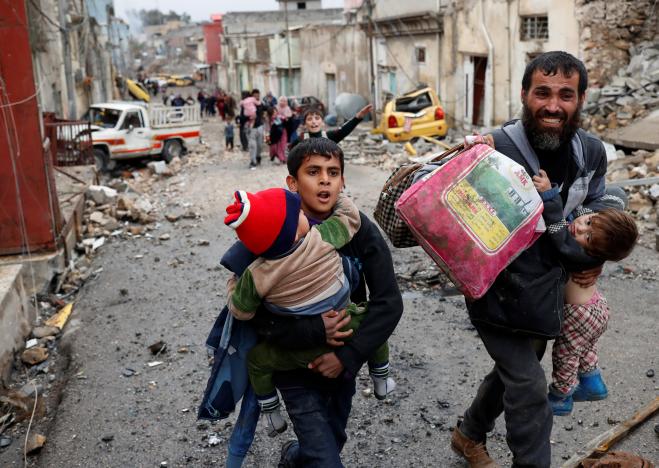Over 40,000 displaced from Mosul in a week as Iraqi forces near old city
- Iraqi forces in Mosul fight Islamic State counter-attack
- Iraqi forces aim to secure Mosul bridge, link up to east bank
- Key Reasons Why 'It'll Take More Than a Few Months' to Free Western Mosul
- Iraq launches offensive on last Islamic State stronghold in Mosul
The pace of displacement has accelerated in recent days as fighting approaches the most densely populated parts of western Mosul, and aid agencies have expressed concern that camps to accommodate people fleeing the city are almost full.
The International Organization for Migration's Mosul Displacement Tracking Matrix showed the number of people uprooted since the start of the offensive in October exceeded 206,000 on Sunday, up from 164,000 on Feb. 26.
 |
| An Iraqi family walks from Islamic State controlled part of Mosul towards Iraqi special forces soldiers during a battle in Mosul, Iraq, March 4, 2017. REUTERS/Goran Tomasevic |
That number may still rise sharply. The United Nations last month warned that more than 400,00 people, more than half the remaining population in western Mosul, could be displaced.
Iraqi forces captured the eastern side of Mosul in January after 100 days of fighting and launched their attack on the districts that lie west of the Tigris river on Feb. 19.
Defeating Islamic State in Mosul would crush the Iraqi wing of the caliphate declared by the group's leader, Abu Bakr al-Baghdadi, in 2014, over parts of Iraq and Syria.
Baghdadi proclaimed the caliphate from Mosul's grand Nuri mosque, in the old city center which is still under his followers' control.
Rapid Response units and Counter Terrorism Service forces launched a fresh push into the city on Sunday after a 48-hour pause due to bad weather that hampered air surveillance, facilitating counter-attacks by the militants.
Rapid Response teams are "very close" to the government buildings near the old city, said a senior media officer with the elite Interior Ministry units.
Their progress was met with heavy sniper and mortar fire, a Reuters photographer reported from Mosul.
The complex, which houses the Nineveh Provincial Council and the Nineveh Governorate buildings, should be taken on Monday, Lt. Colonel Abdel Amir al-Mohammadawi told Reuters.
Recapturing the site would help Iraqi forces attack the militants in the nearby old city. It would also mark a symbolic step towards restoring state authority over Mosul, even though the buildings are destroyed and not being used by Islamic State.
Rapid Response units captured have captured the Danadan district, which lies just south-east of the complex, while U.S.-trained Counter-Terrorism Service units pushed through Tal al-Ruman and the Somood districts, in the south-west.
The Iraqi military believes several thousand militants, including many who traveled from Western countries, are hunkered down among the remaining civilian population, which aid agencies estimated to number 750,000 in western Mosul at the start of the latest offensive.
The militants are using suicide car bombers, snipers and booby traps to counter the offensive waged by the 100,000-strong force of Iraqi troops, Kurdish peshmerga fighters and Iranian-trained Shi'ite Muslim paramilitary groups.
They were also reported to have fired rockets and mortar rounds filled with toxic agents from the western side of the city to the eastern, government-controlled side.
The Organization for the Prohibition of Chemical Weapons (OPCW) offered to assist the Iraqi government investigating the use of chemical weapons in Mosul.
Twelve people, including women and children, are being treated in Erbil, the capital of the Kurdish region east of Mosul, for possible exposure to chemical agents causing blisters, eye redness, vomitting and irritation, the United Nations said on Saturday.
Islamic State used chemical weapons at least 52 times in Iraq and Syria and at least 19 times in the areas around Mosul between 2014 and November 2016, according to data collected by IHS Markit.
Several thousand people have been killed or wounded so far in the Mosul offensive, both civilians and military, according to aid organizations.

